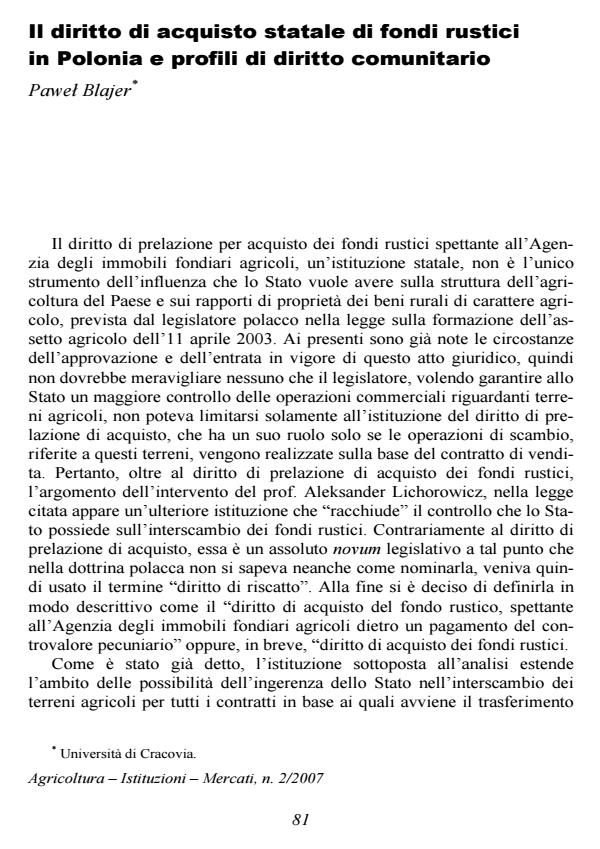Il diritto di acquisto statale di fondi rustici in Polonia e profili di diritto comunitario
Titolo Rivista AGRICOLTURA ISTITUZIONI MERCATI
Autori/Curatori Pawel Blajer
Anno di pubblicazione 2008 Fascicolo 2007/2
Lingua Italiano Numero pagine 13 P. 81-93 Dimensione file 150 KB
DOI
Il DOI è il codice a barre della proprietà intellettuale: per saperne di più
clicca qui
Qui sotto puoi vedere in anteprima la prima pagina di questo articolo.
Se questo articolo ti interessa, lo puoi acquistare (e scaricare in formato pdf) seguendo le facili indicazioni per acquistare il download credit. Acquista Download Credits per scaricare questo Articolo in formato PDF

FrancoAngeli è membro della Publishers International Linking Association, Inc (PILA)associazione indipendente e non profit per facilitare (attraverso i servizi tecnologici implementati da CrossRef.org) l’accesso degli studiosi ai contenuti digitali nelle pubblicazioni professionali e scientifiche
Apart from right of preemption of real estates, the law of 11th april 2003 concedes to the Real Estates Agency another important privilege which in Polish literature is commonly known as the right of acquisition of real estates. The regulation of this institution must be considered to be particularly complicated. However, the main aim of introduction of this notion to the Polish legal system was to strengthen the statal control over the trade of real estates in Poland. The right of preemption, which was a subject of lecture of prof. A. Lichorowicz, refers only to the sale contracts. The right of acquisition, on the other hand, gives the Agency possibility to interfere in all other types of contracts on condition that they cause transfer of property of real estates. Consistently, Agency is authorised to exercise right of acquisition not only in cases of such typical contracts as: donation, exchange or annuity, but also all other contracts which result in transfer of property but do not constitute a sale contract (liquidation of joint ownership, transfer of property as a result of legacy). After long discussion in Polish doctrine, the opinion has become general that such contracts should have unconditional character. The number of exceptions from right of acquisition is strictly limited. However, an exception of the greatest practical significance allows to transfer property of real estate without any restrictions resulting from right of acquisition if a purcheser belongs to the group of persons related to a vendor. The above-mentined form of right of acquisition may call in question its conformability with EC Treaty, especially with previsions concerning free movement of capital (understood as unlimited investments in the real estates over the whole territory of EU). ‘Grounds of public policy or public security’ (art. 58 EEC Treaty) can hardly justify such a severe statal intervention in the free trade of real estates. Moreover, right of acquisition seems to be incompatible with a prohibition on discrimination of EU citizens and a proportionality principle two other fundamental principles of EC law resulting from numerous sentences of European Court of Justice (e.g. Konle v Austria, In re Albore or Doris Salzmann). Finally, one may contest compatibility of this institution with Polish constitution. Taking all these factors into account, it would be highly reasonable to consider the elimination of this institution from the Polish legal system.
Pawel Blajer, Il diritto di acquisto statale di fondi rustici in Polonia e profili di diritto comunitario in "AGRICOLTURA ISTITUZIONI MERCATI " 2/2007, pp 81-93, DOI: